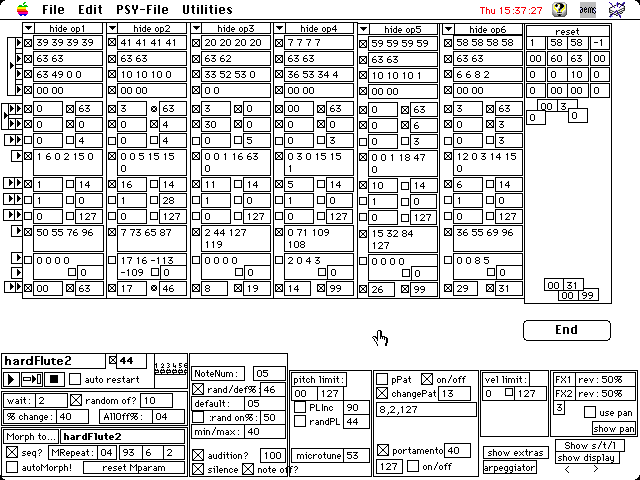rhoadley.net music research software blogs
vimeo youtube gallery
five pieces sextet through the sharp hawthorn only connect in principio miscellaneous concertino three pieces for two pianos four archetypes petrochemicals copenhagen ambience hello histrionica telephony many worlds 127 haiku 128 haiku triggered touching sound 127 messages
calder's violin fluxus fluxus tree player piano three streams quantum canticorum december variations december mobile semaphore piano glyphs how to play the piano choreograms edge violations homage unthinking not songs graffiti
devices: gaggle gagglina wired threads glyphs metapiano digiphone
NB All material on this site is © Richard Hoadley (and others), 1980-2023
A Continual Snowfall of Petrochemicals
automatic music for computers and Yamaha SY synthesisers
1998/9
A Continual Snowfall of Petrochemicals: Bell Loop Session track 22 by rhoadley
Slow Wamp Session, Friday 29th January, 1999, 42:47, 39.2MB
Bell Loop Session, Thursday 28th January, 1999, 1:06:30, 60.9MB
Hard Flute Session 1, 14th January, 1999, 32:11, 29.5MB
Hard Flute Session 2, 14th January, 1999, 32:11, 30.2MB
And for all its breathtaking size and novelty, the biosphere of Jupiter was a fragile world, a place of mists and foam, of delicate silken threads and paper-thin tissues spun from the continual snowfall of petrochemicals formed by lightning in the upper atmosphere. Few of its constructs were more substantial than soap bubbles; its most terrifying predators could be torn to shreds by even the feeblest of terrestrial carnivores...Arthur C Clarke, 2010, 1988, Grafton
Program note to the original installation, Cambridge Digital Arts Festival, West Road Concert Hall, Cambridge, July 1998:
A Continual Snowfall of Petrochemicals is created anew each time it is 'played' by a small computer program currently being developed by myself - psy. It takes certain parameters of any given voice synthesised by the Yamaha SY77 or SY99 synthesiser alters them by a certain amount and according to certain rules, re-outputs them and them plays the new sound (again, according to certain parameters). Currently, the program can be 'directed' to a certain, limited extent - you may start with one sound and more or less gradually move it towards another, but often the best results are those obtained by simply allowing the thing to do what it 'wants' without human interference.
The program and the piece (does one exist without the other?) are conceived as experiments in the creation of a live form of electroacoustic music that contains some of the unpredictability of acoustic music, in investigating the nature of the musical performance and in understanding the roles of teliology and cause and effect in music.

Screenshot of the original Mac version
A Continual Snowfall of Petrochemicals is an installation piece 'performed' by one or more (preferably three to five) Apple Macintosh computers and the same number of Yamaha SY77 or SY99 synthesisers. The computers run an original piece of software called pSY, (screenshot given above). This software is built around Apple's own interface software Hypercard, and the existing version of pSY will only run on pre-G3 Macintosh computers. This version of pSY uses the MIDI XCMDs from HyperMIDI.
The software is available here.
Algorithmic Composition
Over the past few years there has been considerable interest in algorithmic composition. This activity generally comes in two flavours: those who attempt to generate emulations of existing more or less specific musical styles (Matthews, Cope, Koan software, etc.) and those who attempt to generate original music through various methods (Xenakis, Birtwistle etc.). Another form uses digital or analogue techniques to alter a live sound source. pSY falls into the central category. It is important to realise that generating original music is a very complex activity. The output of most 'original' generating software is 'framed' by the human that has created it, so providing the vast part of the structure. pSY attempts to avoid this, and to create a stand-alone music generating program. The experiment is seeing how possible it is to create satisfying music solely through computer algorithms.
The pSY Sessions
As a result of the above, the CDs available are, by definition, a sort of 'petrification' of what should be a 'live' performance. These sessions consisted of arranging for five computers and synths to 'perform' (under my guidance). The results were recorded and are presented on the CDs. The resulting material is not to be regarded as equivalent to a 'finished' piece of western art music - more as a sort of free improvisation or ambient sound. Ultimately, the material is merely an experiment in control of musical material by software that is algorithmic, but does not 'sound' algorithmic in the traditional sense. This is substantially helped by the use of the SYs, which are fairly unique amongst commercial synthesisers in utilising the synthesis method known as Frequency Modulation. This is a complex, mathematical method in which very small changes to certain parameters can cause radical differences, thus enabling a wide range of relatively unpredictable sounds (while maintaining a general predictability). These features and others were subsequently utilised further (and in more controlled ways) in the new version of pSY used to create the composition The Copenhagen Interpretation.
It is therefore recommended that one listens to these sessions as ambient sound - feeling free to change tracks, repeat, reprogram (or turn off!) at will.
Audio version
Slow Wamp Session, Friday 29th January, 1999, 42:47, 39.2MBBell Loop Session, Thursday 28th January, 1999, 1:06:30, 60.9MB
Hard Flute Session 1, 14th January, 1999, 32:11, 29.5MB
Hard Flute Session 2, 14th January, 1999, 32:11, 30.2MB
Relevant excerpts (in preparation):
|